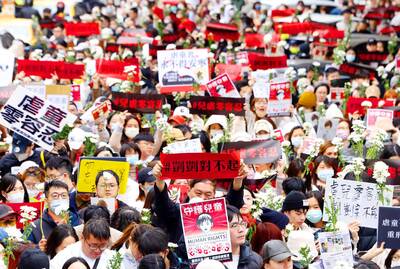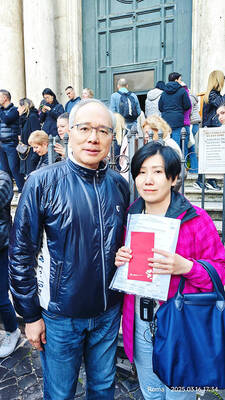Republican Senator John Cornyn on Tuesday accused US President Barack Obama of treating Taiwan in a “deplorable” way and said he was attaching an amendment — aimed at forcing the White House to sell Taipei advanced F-16C/D jets — to a vitally important trade bill.
The provision was to be introduced yesterday, when the Obama administration was expected to officially unveil its latest Taiwanese arms deal package to Congress.
Senior administration officials have already leaked word that the package will not include the 66 F-16C/Ds that Taiwan desperately wants to modernize its air force.
Rather, it will focus on an offer to refit and refurbish Taiwan’s existing fleet of aging F-16A/B aircraft.
Large numbers of both Republicans and Democrats on Capitol Hill are furious at the White House’s refusal to sell the new jets and have accused the president of bowing to Chinese pressure.
They are ready to stage a major fight to force the sale and Cornyn’s move is generally seen as the first round.
At a “media availability” arranged by the Republican leadership, Cornyn said: “The bill on the floor is a trade bill, and the good thing about trade is the things that we grow and that we make in the United States and sell abroad create jobs right here at home.”
“But I’m going to introduce an amendment having to do with foreign military sales, specifically the sale of 66 F-16 aircraft to Taiwan,” he said.
“Both the people who would be our adversaries, as well as our friends around the world, look at the way we treat our allies. And, frankly, the way the administration is treating our ally Taiwan — covered by the Taiwan Relations Act, which requires us to provide defensive weapons for Taiwan to defend itself against a possible Chinese attack — is deplorable,” he added.
The legislation to which Cornyn’s amendment will be attached is the Trade Adjustment Assistance Bill, which Obama favors and supports.
If Cornyn can raise enough votes in the House and Senate to pass the bill containing his amendment, Obama would then be forced to either sign it and sell the F-16C/Ds or veto the entire bill and lose the trade provisions for which he has fought.
“Unfortunately, as the bullies around the globe look at the way we treat our friends, it emboldens them and does not cause them any concern that we will meet force with force if absolutely necessary and if there’s no other alternative,” Cornyn said.
“And finally, making things here in America and selling them abroad for cash doesn’t cost taxpayers a dime and it creates jobs here at home. This would help create jobs here at home, in addition to the national security requirement,” he said.
Cornyn’s amendment is based on a bill he introduced last week with Democratic Representative Robert Menendez called the Taiwan Airpower Modernization Act of 2011.
That bill was cosponsored in the Senate by Democrat Richard Blumenthal, Independent Joe Lieberman, Republicans Tom Coburn, James Inhofe and Jon Kyl.
Republican Senator John McCain has said that he is leaning toward supporting Cornyn and that he has “serious concerns” about Obama’s decision not to sell the advanced fighters.
Reflecting the arguments the White House will make to Congress this week, administration officials speaking on the condition of anonymity say the decision to upgrade the old fighters rather than sell new ones is “a smart defense policy — it makes a real and immediate contribution to Taiwan’s security.”
They add that refurbishing the older planes will cost less and will provide Taipei with planes that are essentially as good as the F-16C/Ds.
Other administration officials have said that Obama was prepared to consider “further sales in the future.”

A crowd of over 200 people gathered outside the Taipei District Court as two sisters indicted for abusing a 1-year-old boy to death attended a preliminary hearing in the case yesterday afternoon. The crowd held up signs and chanted slogans calling for aggravated penalties in child abuse cases and asking for no bail and “capital punishment.” They also held white flowers in memory of the boy, nicknamed Kai Kai (剴剴), who was allegedly tortured to death by the sisters in December 2023. The boy died four months after being placed in full-time foster care with the

A Taiwanese woman on Sunday was injured by a small piece of masonry that fell from the dome of St Peter’s Basilica in the Vatican during a visit to the church. The tourist, identified as Hsu Yun-chen (許芸禎), was struck on the forehead while she and her tour group were near Michelangelo’s sculpture Pieta. Hsu was rushed to a hospital, the group’s guide to the church, Fu Jing, said yesterday. Hsu was found not to have serious injuries and was able to continue her tour as scheduled, Fu added. Mathew Lee (李世明), Taiwan’s recently retired ambassador to the Holy See, said he met

A BETRAYAL? It is none of the ministry’s business if those entertainers love China, but ‘you cannot agree to wipe out your own country,’ the MAC minister said Taiwanese entertainers in China would have their Taiwanese citizenship revoked if they are holding Chinese citizenship, Mainland Affairs Council (MAC) Minister Chiu Chui-cheng (邱垂正) said. Several Taiwanese entertainers, including Patty Hou (侯佩岑) and Ouyang Nana (歐陽娜娜), earlier this month on their Weibo (微博) accounts shared a picture saying that Taiwan would be “returned” to China, with tags such as “Taiwan, Province of China” or “Adhere to the ‘one China’ principle.” The MAC would investigate whether those Taiwanese entertainers have Chinese IDs and added that it would revoke their Taiwanese citizenship if they did, Chiu told the Chinese-language Liberty Times (sister paper

The Shanlan Express (山嵐號), or “Mountain Mist Express,” is scheduled to launch on April 19 as part of the centennial celebration of the inauguration of the Taitung Line. The tourism express train was renovated from the Taiwan Railway Corp’s EMU500 commuter trains. It has four carriages and a seating capacity of 60 passengers. Lion Travel is arranging railway tours for the express service. Several news outlets were invited to experience the pilot tour on the new express train service, which is to operate between Hualien Railway Station and Chihshang (池上) Railway Station in Taitung County. It would also be the first tourism service